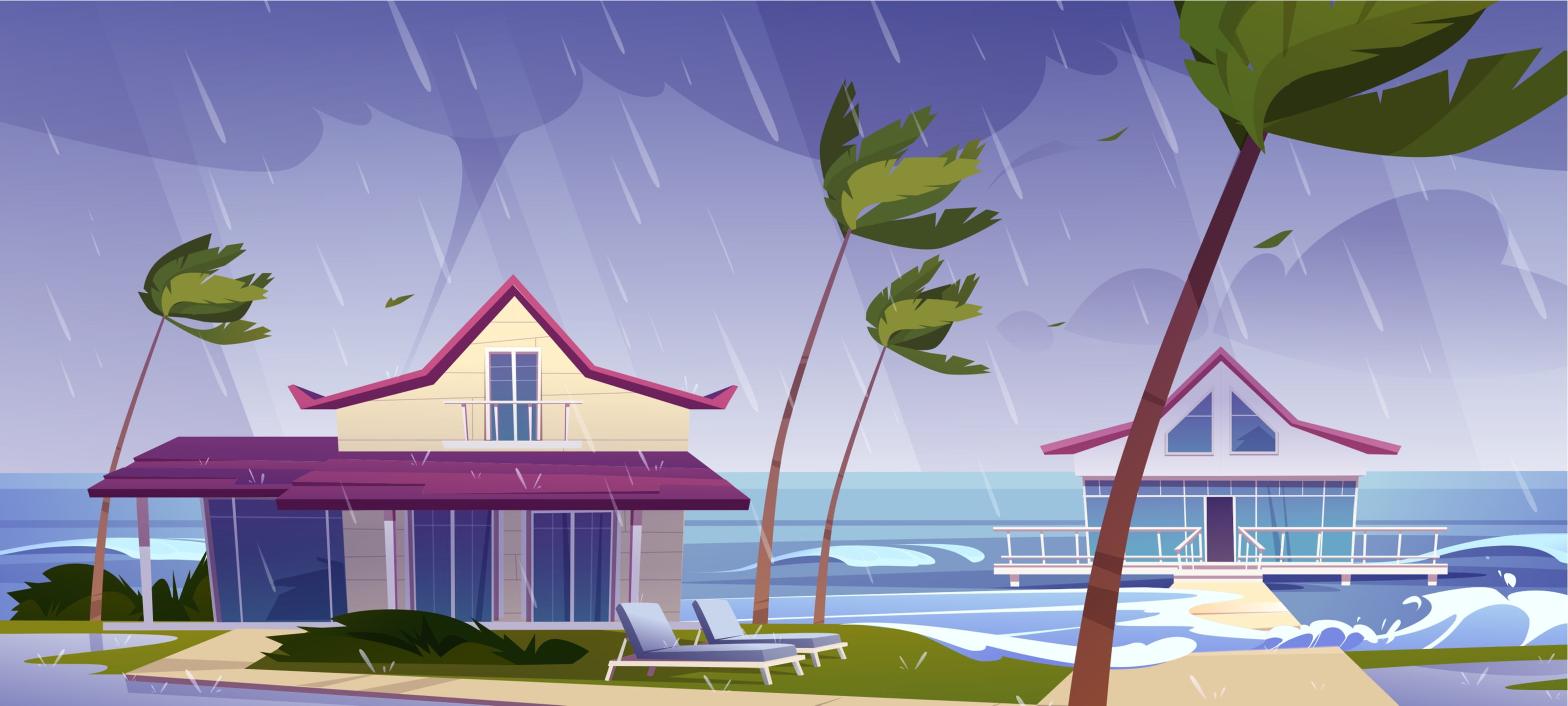Marketplace Suites Blog
10 Travel Tips For The U.S Virgin Islands During Hurricane Season

When is Hurricane Season in the Virgin Islands?
Hurricane season in the US Virgin Islands (St. Thomas, St. Croix, and St. John) is usually from July to November with peak season occurring in October and September. The USVI is at risk for hurricanes or tropical storms from June 1 to November 30, with the peak period starting in mid-August and ending before October 31.
Hurricane season sounds sort of ominous when you have only seen catastrophic devastation on TV. With the recent devastation of Hurricane Harvey, Irma and Maria, travelers are understandably worried about their safety. However, hurricane season may actually be one of the best times to visit St John Virgin Islands. To help put your anxiety to rest, we offer up some tips for navigating travel to St John during hurricane season.
St. John, along with its sister U.S Virgin Islands (USVI) , St Croix and St. Thomas, is a Caribbean paradise! However, its location in the Eastern Caribbean also makes it particularly vulnerable to tropical storms and hurricanes.
Which Months are the Most Likely Months a Hurricane will hit St. John?
In 2021 the season erupted in full force in August with Hurricane Ida. Ida originated as a tropical storm in the Caribbean but later made landfall at the end of August, where it lashed the mainland in Louisiana with Category 4 wind speeds. In St John, specifically, John the Baptist Parish indescribable amounts of rain. Some public figures in St Johns argued that the sunken parish was hit harder than any other parish in the Virgin Islands. Estimated by local government that 8 out of 10 search and rescue efforts that occurred on the Virgin Islands due to Ida, were conducted in John the Baptist Parish due to the causing of unprecedented flooding.
Hurricanes do not hit the Virgin Islands every year but, in an off chance year, the more damaging types of hurricanes are most likely to occur during September and October.
Virgin Island Hurricane Season Risk Levels and Probable Intensity (by month)
| Month | Hurricane Risk | Probable Intensity of Hurricane Hit (by month) | Year Hurricane Hit Virgin Islands |
| June | Cautious | Possibly Some Damage | Tropical Storms but no Hurricanes |
| July | Cautious | Possibly Some Damage | 1996 |
| August | Possible | Potentially Devastating | 1871, 2000 |
| September | Highest | Potentially Catastrophic | 1876, 1960, 1989, 1995, 1998, Irma 2017, Maria 2017 |
| October | Possible | Potentially Devastating | Tropical Storms but no Hurricanes |
| November | Cautious | Possibly Some Damage | Tropical Storms but no Hurricanes |
How Frequently Do Hurricanes Hit the USVI?
Hurricanes pass near the USVI every year but do not directly hit the Islands, but even when the islands are not directly hit, they may still experience tropical storms. The USVI is usually affected by a hurricane or major storm every four to six years, while a hurricane makes a direct hit on land around every eight years.
Average years between a major hurricane hitting the Virgin Islands is every 16.55 years
Statistically the Virgin Islands should be affected by a hurricane by end of 2022, with some speculation that a potential direct hit could occur by mid hurricane season 2023. In this era of climate change, anything is possible and even improbable off season hurricanes, imaginably could begin to strike outside of our expected climate cycles.
Understanding the Hurricane Categories
It’s good to understand hurricane categories so you know what to expect and plan accordingly. The Saffir-Simpson Hurricane Wind Scale assigns hurricanes a rating in terms of their severity and wind speed.
Saffir-Simpson Winds Scale Ratings:
- Category 1: Sustained winds = 74-95 mph
- Category 2: Sustained winds = 96-110 mph
- Category 3: Sustained winds = 111-129 mph
- Category 4: Sustained winds = 130-156 mph
- Category 5: Sustained winds = 157+ mph
As you can tell, Cat 1 is the least severe, and Cat 5 is the most devastating. So, to put it in perspective, a Category 5 Hurricane causes the most destruction. Irma was a Category 5 hurricane when it hit St. John then made landfall in parts of the U.S. and terrorizing the British Virgin Islands in September, 2017. She was also the strongest hurricane ever reported in the U.S. Virgin Islands, with sustained wind speeds of 177 mph.
Should You Travel to the Caribbean During Hurricane Season?
Even though it's true that the Caribbean islands are more likely to be affected by a hurricane in the active season, there are several benefits of traveling during this time. For example, many people avoid going through airports or on boats during hurricane season. Because of this, you will find very few crowds and long lines at the guest services desk. Additionally, the beaches will be less crowded.
The best time to purchase plane tickets for travel to St. John is also during hurricane season, as prices are typically lower than at other times of the year. The same goes for resorts and hotels, which offer much better deals on accommodations and packages during the active hurricane season.
So, given the facts that hurricanes and storms directly hit St. John so infrequently and that there are several benefits to traveling during the hurricane season, you may decide a tropical vacation is in your near future.
How do Hurricanes Affect Travel?
Hurricanes and tropical storms can cause limited flight availability and airport closures due to electricity shortages and terminal damage. In addition, strong winds and floods can cause structural damage to roads and may interfere with getting around St. John by vehicle.
10 Things You Can Do to Travel Safely
Statistically, the chances of a hurricane or tropical storm occurring on St John during your visit are very slim to none. But, as history has shown time and again, hurricanes are unpredictable storms that can hit land at any point during hurricane season.
As such, it's best to be prepared for anything when traveling to St John, Virgin Islands. There are things you can do before and during a trip to ensure travel safety and reduce stress levels, including:
- Researching the history, forecasts and patterns of hurricanes in your area.
- Reading the fine print of your flight and hotel reservations before finalizing your excursion to St. John, USVI, as some companies are more accommodating in the event of a hurricane or tropical storm than others.
- Buying travel insurance that covers hurricanes, especially if you are traveling there during the peak hurricane period. Buy it early, too, like right after purchasing the fare for your trip.
- Making sure that all travel arrangements are well planned and finalized prior to your trip.
- Taking a cruise vs. taking a flight. Many offer add-on hotel stays. Also, ships can see a storm coming and can change their itinerary as needed.
- Packing emergency supplies and some food that won’t perish. That way, you don’t get stuck in the Virgin Island’s version of panicked shoppers buying “milk, eggs and flour” as you see on the mainland before and after bad storms.
- Having cash on hand. If the power goes out during a storm, your plastic is immediately rendered useless. Take out as much currency as needed to buy ice, food, and beverages when your supplies run out.
- Making a plan. Just like residents in hurricane-affected areas, make a plan for what you and your family will do should a storm or hurricane interrupt your vacation. That includes setting up meeting points, creating contingency plans if your phones go out, and having emergency points of contact back home.
- Gather emergency supplies for use during and after a hurricane. The USVI Department of Health has a comprehensive list here of what to pack for this kit, along with other helpful hurricane preparedness tips.
- Using the United States Virgin Islands St Croix, St. John and St. Thomas’s official website. It has sources for traveler’s itineraries, including the travel portal for COVID-19 information and guidelines, festivals, “voluntourism” and more.
How to Stay on Top of Hurricane and Tropical Storm Warnings
The nice thing about hurricanes is you generally know they’re coming. That said, it’s a good idea for you to track the storm’s path. Here are a few tools that can keep you abreast of local weather while en route or when you arrive at St John USVI:
- Weather apps: The Weather Channel app is handy for staying on top of the weather, although Accuweather, Dark Sky RadarCast, and Storm Shield are good too.
- The National Hurricane Center: Bookmark and use nhc.noaa.gov during travel. That is the official website of The National Hurricane Center, and NOAA will be the first to post the latest forecast data and tracking information.
- Preparedness websites: Sites like the American Red Cross hurricane app are good for emergency contact tracking, storm updates and preparedness info.
How Safe are St John Resorts During a Hurricane?
St John resorts are typically safe during hurricane season due to the fact that they are on higher elevation, however, there have been a few instances where hurricanes moved in quickly and damaged or destroyed St John vacation rentals. Talk with your travel agent about their experiences dealing with past hurricanes and adjust your trip accordingly if necessary.
The Takeaways
The islands are beautiful all year round but just because there is a chance for hurricanes does not mean you have to avoid St John and travel elsewhere. The odds that your vacation will be affected by one or more major storms are actually quite low, and when they do occur, most often it results in only minor flooding and other non-consequential events.
What Happens if You Have an Emergency Cancellation?
If you are traveling to the St. John USVI during hurricane season or any other time, why not book a stay with Marketplace Suites? We offer top notch experiences for luxury travelers that are packed with the finest amenities!
What’s more? While other hotels may not allow you to rebook in the event of hurricanes and tropical storms, we have a liberal hurricane exception policy. With it, we allow our guests to come back at a later date or receive a full refund (sans a 5% processing fee) in the event of a tropical storm or hurricane that the forecast says will pass less than 100 miles from your suite in St. John.
To find out more about Marketplace Suites and to answer any questions about your stay, please contact us at 1-800-627-6610. We’ll be glad to talk to you!







